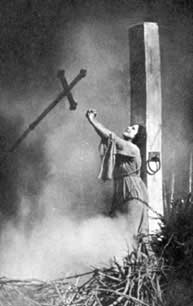Janaury 4, 1917 [Joan the Woman]

They're tearing each other to pieces in Europe. I don't know what to do: The anguish of it cuts like a knife—right through my anger, those moments I'd like to find the villain and ... what, I hesitate to write. It is a fantasy I have to hold away from myself, like a squirming thing, before it coils too tightly.
And as the months pass it becomes more difficult. I write in secret that I am opposed to our getting into it—and at the same time I want us to do something. Wilson is keeping us out of it, I think; but what else can we do? This is all but unbearable.
Cecil B. DeMille, of course, labors mightily to relieve me of the burden of uncertainty. An English soldier digs his trench and finds a sword—and Joan of Arc appears, and takes him, dream or no, into her story. She prays and grows adamant, she takes up a coward's discarded sword (a sharp edge if ever there was one!) and dons a fallen soldier's gauntlet. God Himself commands—and in turn Joan exhorts the English soldier in our century to atone for his nation's sin—her martyrdom—by carrying on. She burns—a horrible, beautiful sequence, as the flame dies slowly to a candle in the trench, the battlefield tinted a royal blue, heralding new kings: every martyr—like her soldier, visited in his own martyrdom. He joins her in Heaven, his duty fulfilled.
At the start of the film, Joan raises her arms in an attitude of crucifixion—and the fleur-de-lis appears behind her: France her cause—and the cause of her martyrdom. But I can't be Joan, no matter how strongly DeMille (and Geraldine Farrar, appropriately operatic as the Maid of Orleans) may insist. There's no clear cause in the mess they've made of themselves—but they may force us to help clean it up. More diabolism in the name of peace.


Comments
Post a Comment